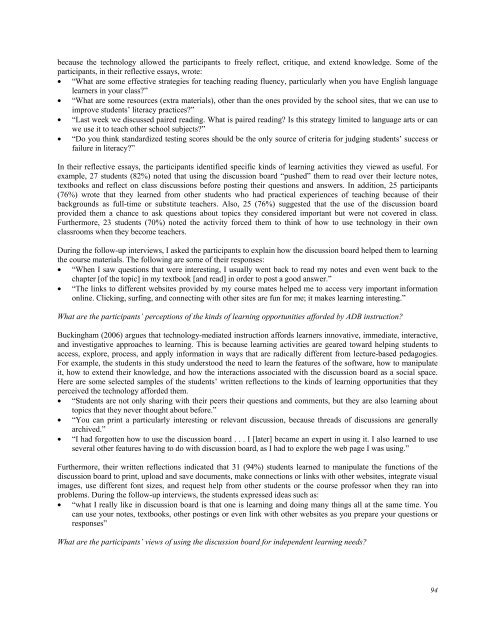Download - Educational Technology & Society
Download - Educational Technology & Society
Download - Educational Technology & Society
You also want an ePaper? Increase the reach of your titles
YUMPU automatically turns print PDFs into web optimized ePapers that Google loves.
ecause the technology allowed the participants to freely reflect, critique, and extend knowledge. Some of the<br />
participants, in their reflective essays, wrote:<br />
• “What are some effective strategies for teaching reading fluency, particularly when you have English language<br />
learners in your class?”<br />
• “What are some resources (extra materials), other than the ones provided by the school sites, that we can use to<br />
improve students’ literacy practices?”<br />
• “Last week we discussed paired reading. What is paired reading? Is this strategy limited to language arts or can<br />
we use it to teach other school subjects?”<br />
• “Do you think standardized testing scores should be the only source of criteria for judging students’ success or<br />
failure in literacy?”<br />
In their reflective essays, the participants identified specific kinds of learning activities they viewed as useful. For<br />
example, 27 students (82%) noted that using the discussion board “pushed” them to read over their lecture notes,<br />
textbooks and reflect on class discussions before posting their questions and answers. In addition, 25 participants<br />
(76%) wrote that they learned from other students who had practical experiences of teaching because of their<br />
backgrounds as full-time or substitute teachers. Also, 25 (76%) suggested that the use of the discussion board<br />
provided them a chance to ask questions about topics they considered important but were not covered in class.<br />
Furthermore, 23 students (70%) noted the activity forced them to think of how to use technology in their own<br />
classrooms when they become teachers.<br />
During the follow-up interviews, I asked the participants to explain how the discussion board helped them to learning<br />
the course materials. The following are some of their responses:<br />
• “When I saw questions that were interesting, I usually went back to read my notes and even went back to the<br />
chapter [of the topic] in my textbook [and read] in order to post a good answer.”<br />
• “The links to different websites provided by my course mates helped me to access very important information<br />
online. Clicking, surfing, and connecting with other sites are fun for me; it makes learning interesting.”<br />
What are the participants’ perceptions of the kinds of learning opportunities afforded by ADB instruction?<br />
Buckingham (2006) argues that technology-mediated instruction affords learners innovative, immediate, interactive,<br />
and investigative approaches to learning. This is because learning activities are geared toward helping students to<br />
access, explore, process, and apply information in ways that are radically different from lecture-based pedagogies.<br />
For example, the students in this study understood the need to learn the features of the software, how to manipulate<br />
it, how to extend their knowledge, and how the interactions associated with the discussion board as a social space.<br />
Here are some selected samples of the students’ written reflections to the kinds of learning opportunities that they<br />
perceived the technology afforded them.<br />
• “Students are not only sharing with their peers their questions and comments, but they are also learning about<br />
topics that they never thought about before.”<br />
• “You can print a particularly interesting or relevant discussion, because threads of discussions are generally<br />
archived.”<br />
• “I had forgotten how to use the discussion board . . . I [later] became an expert in using it. I also learned to use<br />
several other features having to do with discussion board, as I had to explore the web page I was using.”<br />
Furthermore, their written reflections indicated that 31 (94%) students learned to manipulate the functions of the<br />
discussion board to print, upload and save documents, make connections or links with other websites, integrate visual<br />
images, use different font sizes, and request help from other students or the course professor when they ran into<br />
problems. During the follow-up interviews, the students expressed ideas such as:<br />
• “what I really like in discussion board is that one is learning and doing many things all at the same time. You<br />
can use your notes, textbooks, other postings or even link with other websites as you prepare your questions or<br />
responses”<br />
What are the participants’ views of using the discussion board for independent learning needs?<br />
94
















